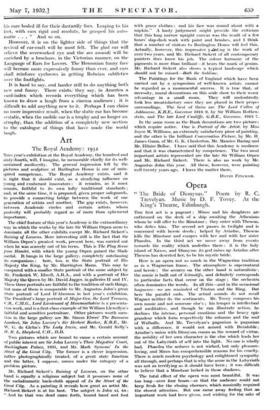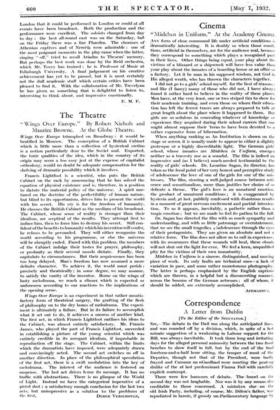Opera
" The Bride of Dionysus." Poem by R. C. Trevelyan. Music by D. F. Tovey. At the King's Theatre, Edinburgh.
THE first act is a pageant : Minos and his daughters are enthroned on the deck of a ship awaiting the Athenians whom lie will offer to the Minotaur ; they enter with Theseus, who defies him. The second act passes in twilight and is concerned with heroic deeds ; helped by Ariadne, Theseus kills the Minotaur and escapes with her and with her sister Phaedra. In the third net we move away from events towards the reality which underlies them : it is the holy island of Naxos, and Dionysus its god raises up Ariadne after Theseus has deserted her, to be his mystic bride.
Here is an opera not so much, in the Wagnerian tradition as in a Wagnerian frame. The atmosphere is supernatural and heroic ; the scenery on the other hand is. naturalistic ; the music is built out of leitmotifs, and definitely corresponds to particular facts that occur on the stage ; the orchestra often dominates the words. In all this—and in the occasional longueurs—we are reminded of Tristan and the Ring. But here the parallel ends. The actual sounds do not recall Wagner neither do the sentiments. Mr. Tovey composes his own music and not someone else's ; his temper is intellectual and meditative, and though he can illustrate action, he declines the intense, personal emotions and the heavy epic grandeur which form respectively the columns and the roof of Walhalla. And Mr. Trevelyan's paganism is paganism with a difference, it would not accord with Briinhilde: Ariadne's union with Dionysus conies as the reward of virtue, the nobility of her own character is the clue which leads her out of the Labyrinth of self into the light. No one is wholly bad. Phaedra the seducer is not wicked, but only pleasure- loving, and Minos has comprehensible reasons for his cruelty. There is much modem psychology and enlightened sympathy all through, and perhaps that is why the scene in the Labyrinth was not as terrifying as it should have been ; it was difficult to believe that a Minotaur lurked in those shadows.
The total effect of the opera was most beautiful. It was tof, long—over four hours—so that the audience could not keep fresh for the closing choruses, which musically required the closest attention. But one came away feeling that an important work had been given, and wishing for the sake of London that it could be performed in London or could at all events have been broadcast. Both the production and the performance were excellent. The •soloists' changed froth day to day : the best all-round cast was on the Saturday, but on the Friday there- was a fine Phaedra. The choruses of Athenian captives and of Nereids were admirable : one of the most poignant moments in the play came when the latter, singing " off," tried to recall Ariadne to Theseus' memory. But pitluips the best work • was done by the Reid orchestra, which Mr. Tovey has trained : he is Professor of Music at Edinburgh I7niversity. A final judgement on his creative achievement has yet to be passed, but it is most certainly not the dull academie,stuff which certain critics have been pleased to find it. With the collaboration of Mr. Trevelyan he has given us something that is delightful to listen to, interesting to think about, and impressive emotionally.
E. M. F.







































 Previous page
Previous page